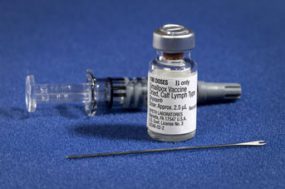What to know
- There are vaccines to protect people from smallpox.
- Currently, smallpox vaccines are not recommended for the general public because smallpox has been eradicated. If there were a smallpox outbreak, health officials would use smallpox vaccines to control it.
- The vaccine does not contain the smallpox virus and cannot give you smallpox.

Overview
Smallpox can be prevented by smallpox vaccines, also called vaccinia virus vaccines. The vaccines are made from a virus called vaccinia, which is a poxvirus similar to smallpox, but less harmful. There are two licensed smallpox vaccines in the United States and one investigational vaccine that may be used in a smallpox emergency.
The replication-competent smallpox vaccines (ACAM2000 and APSV) can protect people from getting sick or make the disease less severe if they receive the vaccine either before or within a week of coming in contact with smallpox virus.
If you get the vaccine:
- Before contact with the virus, the vaccine can protect you from getting sick.
- Within 3 days of being exposed to the virus, the vaccine might protect you from getting the disease. If you still get the disease, you might get much less sick than an unvaccinated person would.
- Within 4 to 7 days of being exposed to the virus, the vaccine likely gives you some protection from the disease. If you still get the disease, you might not get as sick as an unvaccinated person would.
Once you have developed the smallpox rash, the vaccine will not protect you.
Available vaccines
Currently, smallpox vaccines are not available to the general public because smallpox has been eradicated, and the virus no longer exists in nature. However, there is enough smallpox vaccine to vaccinate every person in the United States if a smallpox outbreak were to occur.
How it works
The smallpox vaccine protects people from smallpox by helping their bodies develop immunity to smallpox. The vaccine is made from a virus called vaccinia, which is a poxvirus similar to smallpox, but less harmful. The smallpox vaccine contains live vaccinia virus, not a killed or weakened virus like many other vaccines. For that reason, people who are vaccinated must take precautions when caring for the place on their arm where they were vaccinated, so they can prevent the vaccinia virus from spreading.
Other live virus vaccines currently used include measles, mumps, rubella, and chickenpox.
Smallpox vaccination can protect you from smallpox for about 3 to 5 years. After that time, its ability to protect you decreases. If you need long-term protection, you may need to get a booster vaccination.
Historically, the vaccine has been effective in preventing smallpox infection in 95% of those vaccinated. In addition, the vaccine was proven to prevent or substantially lessen infection when given within a few days after a person was exposed to the variola virus.
Routine smallpox vaccination among the American public stopped in 1972 after the disease was eradicated in the United States.
Fact
Possible side effects
For most people with healthy immune systems, live virus vaccines are effective and safe. Sometimes a person getting a live virus vaccine experiences mild symptoms such as rash, fever, and head and body aches. In certain groups of people, complications from the vaccinia virus can be severe.
Learn more about the possible side effects of smallpox vaccination.
